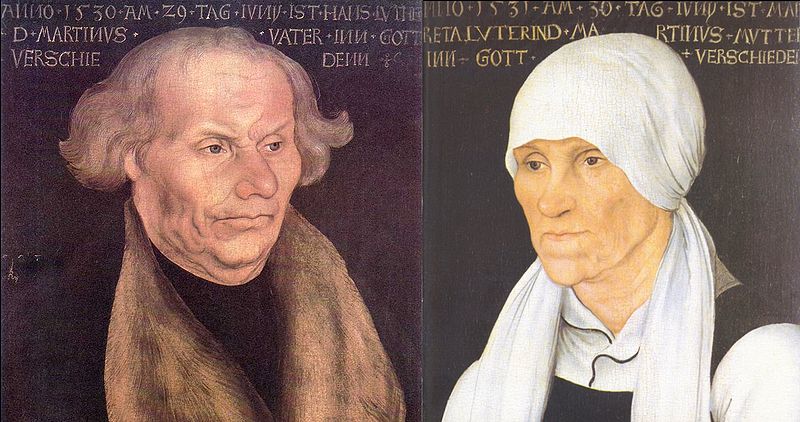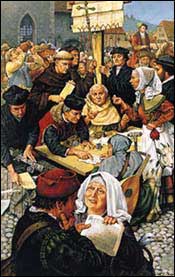
 |
| Martin Luther |
Last night, Roy and I watched a PBS DVD on Martin Luther. Excellent.
I don’t know when we have last had to pause a documentary because we were laughing so hard. We found the comments of the scholars hilarious.
The documentary goes through Luther’s childhood with unloving, lower middle class, but ambitious upwardly mobile parents who wanted him to become a lawyer to fulfil their dreams for him.
 |
|
Portrait of Martin Luther’s parents of Lucas Cranach
After a dramatic conversion, during a lightning storm, he commits his life to God. (Good move!) “My father raged and acted like a fool. How was he to know that one monk in the family would bring him more fame and shame than a thousand advocates.” Luther writes.
|
Luther then joins one of the strictest monastic orders in Europe, the Eremite Augustinians of Strict Observance
Luther did whatever he did 110%. (That must be the secret of the people who accomplish several lifetimes’ work in one.)
And so he throws himself in a regimen of praying, fasting, confessions, whippings, watchings. He says, “If ever a man could be saved by monkery, it would have been I. If I had continued any longer, I would have killed myself” He later blamed his ascetic practices for permanently ruining his health.
He is disgusted by the worldliness, extravagance and cynicism, he sees on a trip to Rome as a young monk, and for the first time starts doubting Catholic teachings–in particular, the buying of indulgences to rescue a soul from purgatory.
The floodgates of doubt open. “Who knows if it is really so,” he wonders.
* * *
* * *
Excessive introspection and obsession with his own sinfulness was ruining his mental, spiritual and physical health. He heart-breakingly writes, “I lost touch with Christ the Savior and Comforter, and made of him the jailor and hangman of my poor soul.”
Von Staupitz appointed the young monk Professor of Bible Studies in the new university of Wittenberg, hoping it would provide a distraction from Luther’s recurrent theological brooding and devastating introspection.
 |
|
Johann Von Staupitz
|
Luther horrified declared that so much work would kill him. To which Von Staupitz replied, “Quite all right, God has plenty of work for clever men in heaven.”
Von Staupitz’s plan, modern scholars say, was that Luther would be so shattered that he would no more time for guilt and introspected, and would collapse and sleep soundly.
Work always operated on Luther as Prozac.
In this case, studying scripture shows Luther that the Catholic church taught much that simply wasn’t so.
* * *
He realized: This whole thing is not about you and the church. It’s about you and God.
Salvation is a gift from God, a gift received through faith. The church has no right to intervene or interfere.
To receive salvation, you simply put out your empty, open hands and receive this gift which God wants you to receive.
Once Luther realized that the spiritual life and salvation is a matter between God and the individual he said, “I felt myself to have been born again, and to have passed through open doors to heaven already.”
We all need to come to this realization, and when we come to it, there is a great revitalization of our spiritual lives, and fresh joy and peace.
The church should never take the place of Christ as the protagonist of the central drama of our spiritual lives. If/when it does, our faith is fair on the way to becoming toxic.
* * *
And so, in accessible language, Luther writes the 95 Theses, the blog posts of the day. He attacks the Church’s excesses, in particular, its greed in the sale of indulgences.
If he had attacked their theology, they may well have ignored him. But he got them where it hurt–he encouraged people not to give it their money.
 |
|
Big Business–The Catholic Church of Luther’s Day.
|
Rome, predictably, was infuriated.
“I never thought that such a story would rise from Rome over one little scrap of paper! ” Luther wrote.
* * *
* * *
For Martin Luther, the mounting fury of the Catholic church inspired not doubt and fear, but an extraordinary courage that would only grow stronger with every attack he faced.
He had the strong idea that if the Christian life was lived authentically, then you must expect to suffer.
Luther seized the criticism of him almost as a confirmation of his vocation as a reformer.
Despite the Papal Bull of excommunication, despite the fact that his life would be in danger if he fell into the hands of the Catholic Church, Luther continued with his attacks on it.
“I decided to believe freely and to slave to the authority of no one , whether council, university or pope. I was bound not only to assert the truth but to defend it with my blood and death,” he wrote.
“I decided to believe freely and to slave to the authority of no one , whether council, university or pope. I was bound not only to assert the truth but to defend it with my blood and death,” he wrote.
He had an extraordinary combination of high idealism, resolve in the single-minded pursuit of an ideal, and naivete!!
* * *
* * *
Luther squared up to the church with a style of opposition it had never encountered before, a surprisingly modern style of opposition.
He discovered a new and powerful weapon on his side–the printing press. For movements to spead, their ideas needed to spread.
The printing press invented in Germany by Gutenberg 30 years before the birth of Luther was to Luther’s day what the internet is to our day. It meant that ideas could travel. They could not be stopped.
The printing press invented in Germany by Gutenberg 30 years before the birth of Luther was to Luther’s day what the internet is to our day. It meant that ideas could travel. They could not be stopped.
As the presses spread his 95 Theses throughout Germany, Luther watched and realized that they could provide him with a vast new audience.
He next wrote, “An Address to the Christian Nobility of the German Nation,” a devastating attack on the pope and the church.
“German money in violation of nature flies across the Alps.”
He attacked the number of secretaries the pope had provided by German tithes (a criticism which could be levelled at some of the princelings of our modern churches).
Luther wrote, “I was not trying to get praise and fame through my writings and little books for almost everyone I knew condemned my harsh and stinging tone.”
* * *
* * *
Alistair Macgrath—”He wrote very well, he wrote very wittily, he wrote very rudely. Many people found themselves fascinated with this man who would use such crude language when arguing with the Pope and with the church.
Luther says, “If Rome is not a brothel above all brothels one can imagine, then I do not know what brothel means.”
“The pope should stand up like the stinking sinner he is.”
“The pope should restrain himself and get his fingers out of the pie.”
The scholars on the programme comment “He’s savvy; he’s grown up among books and writing from a young age; he’s good at instinctively sensing what words and arguments will work best for whom.”
“He is an incredible writer. He uses earthy ordinary language; he’s just fun to read out loud; he’s sarcastic, he’s witty, he’s profound. If you get attacked by Luther, you are just torn up one side, and down the other.”
Luther next writes, “On the Babylonian Captivity of the Church,” an attack on Catholic sacraments. If you are going to build, you sometimes have to demolish and this was a work of considerable destructive harshnbess
Luther started something that snowballed throughout Germany.
* * *
* * *
Luther was summoned before the Holy Roman Emperor, Charles V at the famous Diet of Worms. Cardinal Aleander, representing the Pope, showed Luther a pile of his books, and asked him if he wrote them, and was willing to recant. Interestingly, for he was just a human being after all, and one potentially facing death at the hands of an unjust institution, he asks for 24 hours to consider his response. Which is famous.
 |
| Luther at the Diet of Worms |
“I do not accept the authority of Popes and councils for they have often erred and contradicted themselves. I am bound by the Scriptures I have quoted and my conscience is captive only to the Word of God. I cannot and will not recant anything for to go against my conscience is neither right nor safe. Here I stand. I can do no other. God help me. Amen.”
One of history’s greatest declarations of exhausted defiance!!
One of history’s greatest declarations of exhausted defiance!!
Luther’s statement marks the dawn of a new era, the ordinary person standing up against authority.
It’s a grand moment when an individual ends up standing for something much larger than himself.
He fully expects that the Church will sentence him to death as a heretic, as it did the Czech reformer, Jan Hus (who also appeared at a Council under a guarantee of safe conduct). However, the vote is inconclusive. Luther is free, though his life is in danger from the Catholic church, which combined spiritual, administrative and judicial authority (a dangerous situation).
It’s a grand moment when an individual ends up standing for something much larger than himself.
He fully expects that the Church will sentence him to death as a heretic, as it did the Czech reformer, Jan Hus (who also appeared at a Council under a guarantee of safe conduct). However, the vote is inconclusive. Luther is free, though his life is in danger from the Catholic church, which combined spiritual, administrative and judicial authority (a dangerous situation).

Luther’s patron, Elector Friedrich the Wise now “kidnaps” Luther–using masked horseman– and spirits him away to Wartburg Castle, where he lives anonymously and quietly, hidden away from the world.
Going from the peaks of glory, attention and notoriety to anonymity and invisibility is a frequent Christian experience.
So Luther goes from the drama and intense experience, the elation and energy of the Diet of Worms to a solitary existence hidden in the Wartburg Castle. He regresses into depression, despair and anguish, introspection and melancholy, and had a strong sense that the devil was tormenting him.
And yet again, he snapped out of depression by using the Prozac which had worked in the past: Work.
He threw himself into one of his greatest enterprises yet–a translation of the Bible into German, thus making scripture accessible to the common man.
* * *
* * *
And while he was in the Wartburg, Germany’s Peasant Revolts commenced, sparked by Luther’s ideas and writings. Luther was horrified as he saw the destruction the reformation entailed. His ideas turned out to be more radical than he had realized.
Disappointly, he does not support the revolting peasants, but attacks them in vicious prose.
Disappointly, he does not support the revolting peasants, but attacks them in vicious prose.
“I simply taught, preached and wrote God’s word. I opposed indulgences and papists, but never with force,” he wrote.
* * *
* * *
Concluding comments from the scholars on the program:
Luther’s story reminds us of the power of individual charisma, charisma which can travel on the written page.
Luther is an elementary force, embodied in language, offering a vision of salvation which is liberating, which resonates, which seems real to so many people. Once you see it that way, you can’t see the world differently.
Luther is irrepressible, he is outrageous, he is witty, and very funny.
He held onto his sense of rage, and his ear for a good phrase. He remained devoted to his principles, and to speaking out.
“When I die, I want to be a ghost, so that I continue to pester the bishops, priests and godless monks so that they can have more trouble with a dead Luther than they had before with a thousand living ones,” Luther wrote.
(An archive post)
Read my new memoir: Rosaries, Reading, Secrets: A Catholic Childhood in India (US) or UK.
Connect on Facebook: https://www.facebook.com/anitamathiaswriter/
Instagram: https://www.instagram.com/anita.mathias/
Twitter: https://twitter.com/AnitaMathias1
My book of essays: Wandering Between Two Worlds (US) or UK


Thanks for reading at my incitement, Sue:)
Thanks for this, enjoyable and rather entertaining. I would like to watch that video.
(The word verification is “incite” !!!)